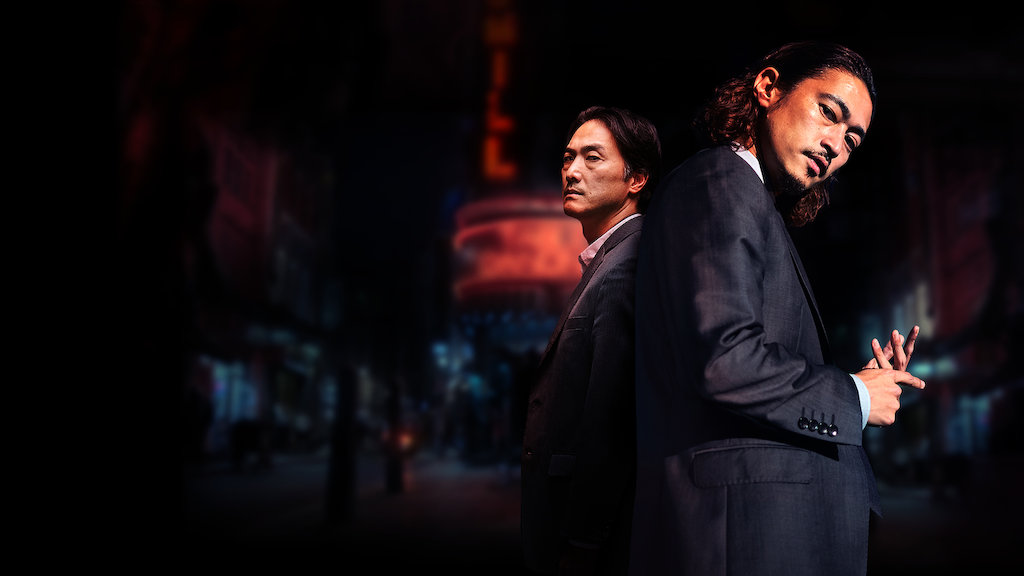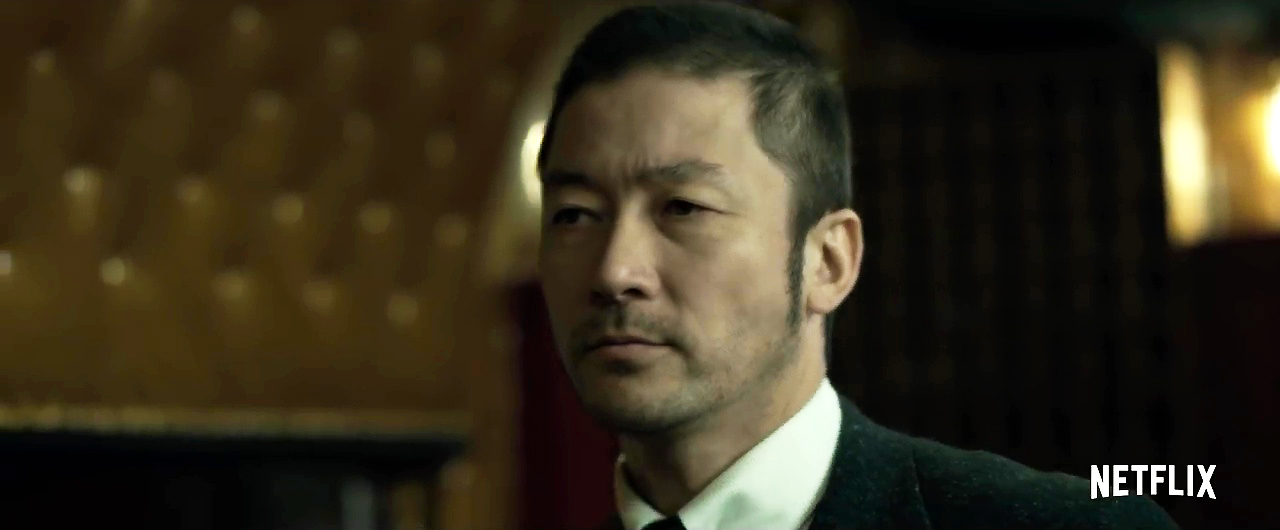Hibana (Spark)
Series Review by David Cirone
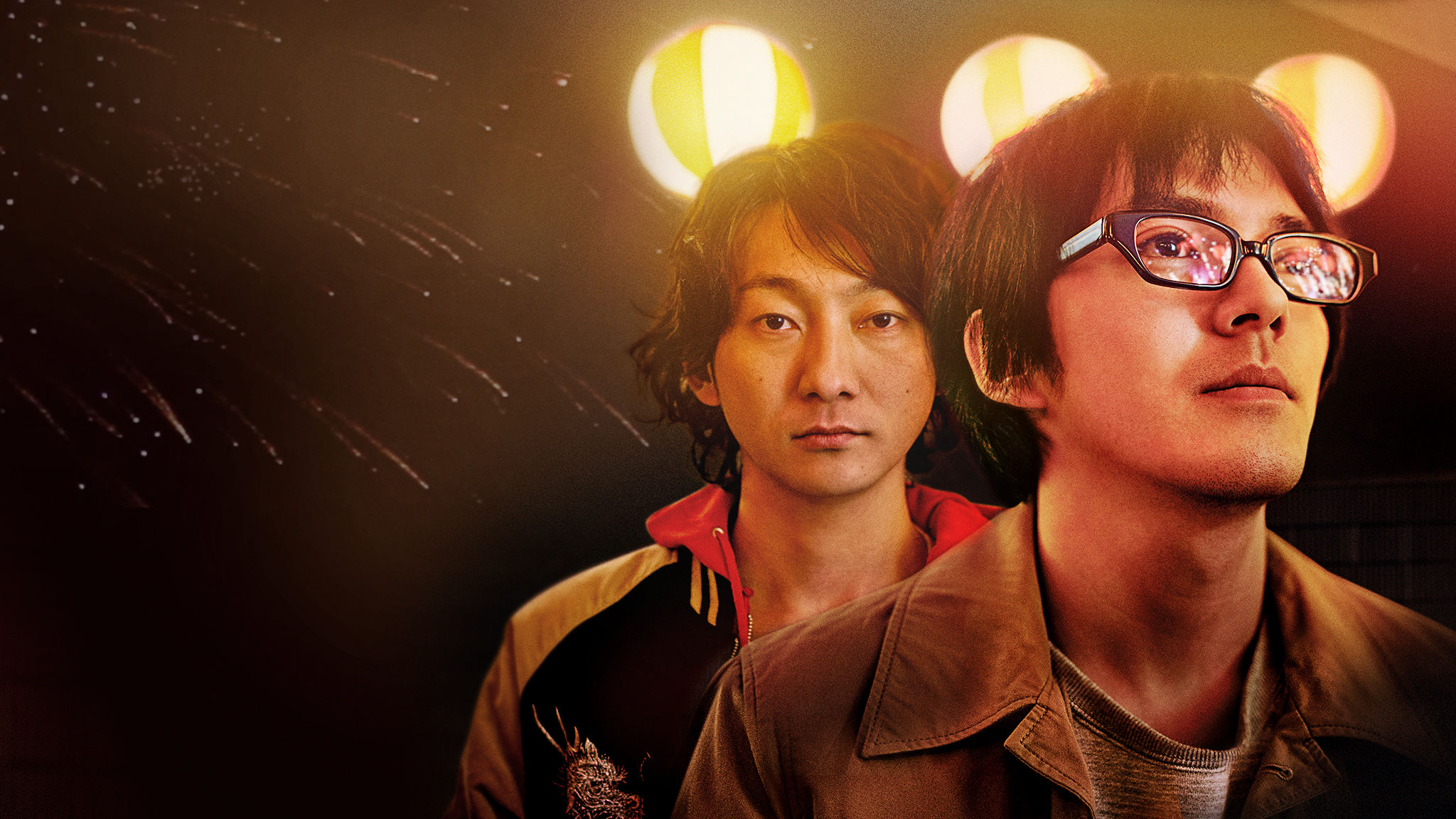
Netflix’s latest Japanese series Hibana (Spark) is a deeply-felt, intelligent character drama about the highs and lows of the “manzai” comedy world, viewed through the complex friendship of its two lead characters, the shy but driven Tokunaga (Kento Hayashi) and the abrasive wild man Kamiya (Kazuki Namioka).
Based on Naoki Matayoshi’s award winning novel, the story spans 10 years, beginning with a bombed performance by Sparks, the young comedy duo of Tokunaga and his schoolboy partner Yamashita (Masao Yoshii). The newbie Sparks is bumped for time at a low-paying beach summer festival and forced to deliver their cerebral act against the tide of crowd noise and loudspeaker announcements. Feeling sympathy for their plight, Kamiya, the leader of the following act, Ahondara (or “airheads”), swears he’ll get revenge, and launches a fierce tirade against the exiting audience, condemning them one-by-one to go to hell.
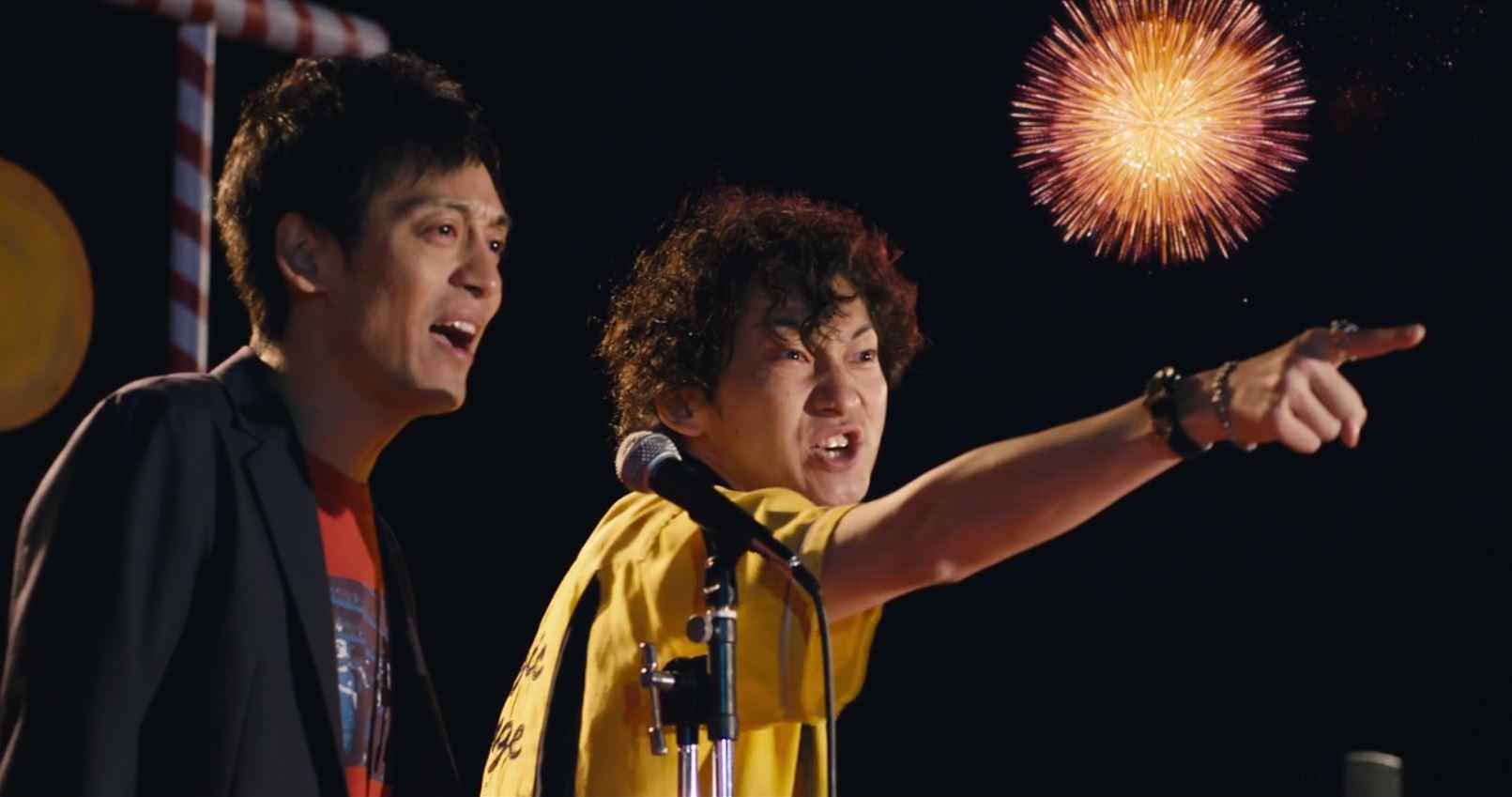
Tokunaga is a dreamer, and he writes Sparks’ comedy with precision and dark, self-deprecating intelligence. He’s instantly in awe of Kamiya’s raw and reckless style, and chases him down after the show for a drink. He humbly asks to become Kamiya’s apprentice (no small request among Japanese professionals), and Kamiya sets up the challenge: write my biography, every day, and I’ll teach you everything I know.
Tokunaga and Kamiya begin their decade-long brotherly bond, and the plot of the series is unpredictable, sometimes frustrating, but brilliantly authentic and ultimately moving. At the heart of Sparks is Kento Hayashi’s portrayal of the conflicted comedian Tokunaga. While others around him become obsessed with fame and landing TV gigs, Tokunaga truly wishes to become a manzai artist. Constantly reminded that his comedy writing is “unique”, Tokunaga aims to be different, and its this aim that connects him to Kamiya. Their dynamic is solid but doomed to always be at odds: Tokunaga’s looking for a way to evolve manzai to something new, and Kamiya wants to deconstruct it.
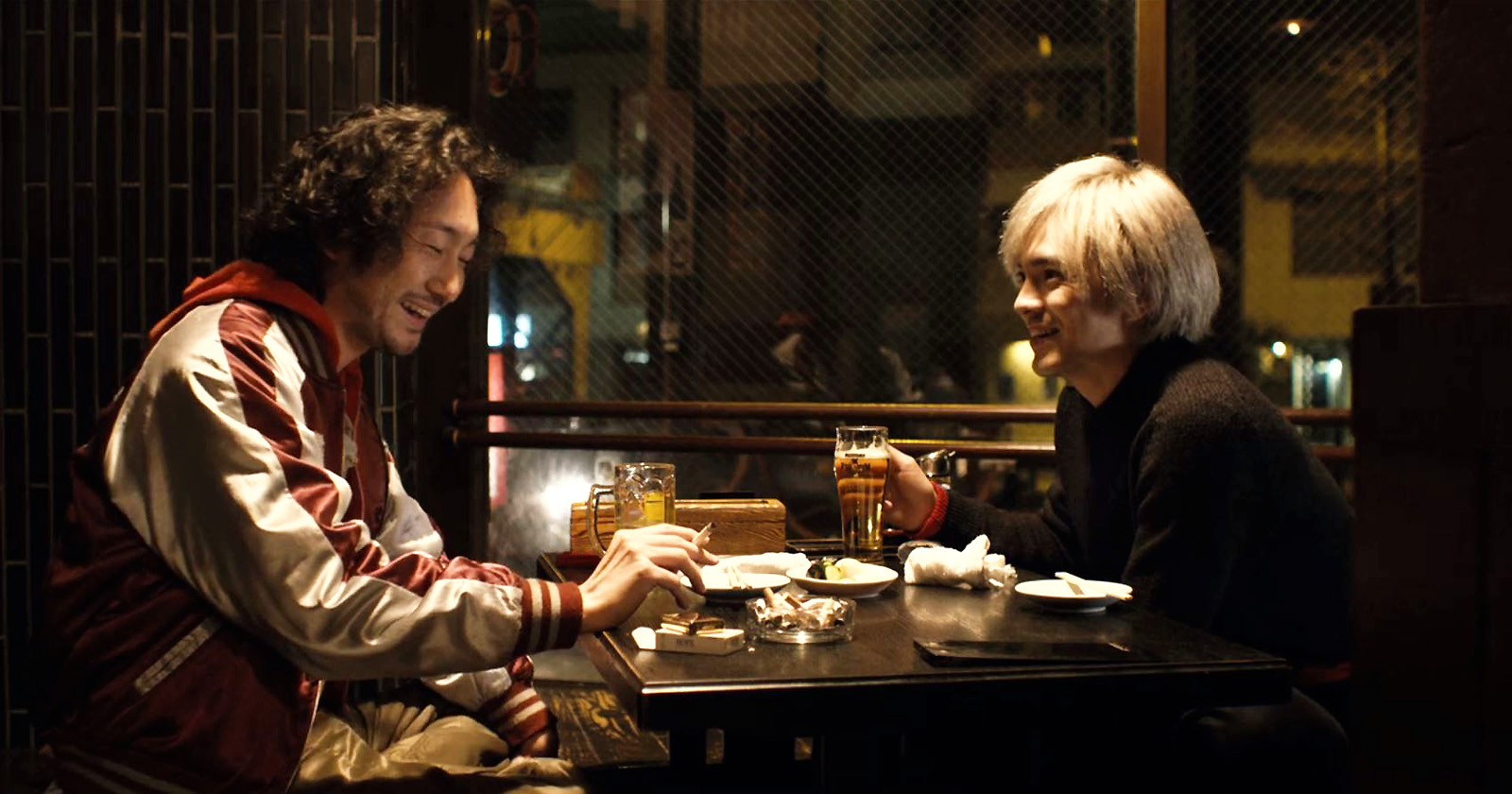
A lesser and more predictable story would combine the two lead characters into a single comedy group (that was my early assumption, and I’m glad I was wrong), but Tokunaga and Kamiya stay loyal to their groups, even as tensions rise internally for each act. Sparks and Ahondara are regarded as “senpai” (seniors) for their longevity and respect garnered from their peers, if not for their industry success. Tokunaga sabotages his career prospects time and time again by passing up the obligatory social meetings with producers where just a little bit of industry schmoozing would go a long way.
The turbulent friendship is the core of Hibana, and the relationship between the two struggling comics is as complex as a marriage. Sometimes they’re the only ones who understand each other, and sometimes they’re the only ones who can hurt each other the deepest. There’s a pivotal scene late in the series where Kamiya, secretly envious of his friend’s success, digs at Tokunaga in the most biting and cleverest way, triggering shame and anger from both men.
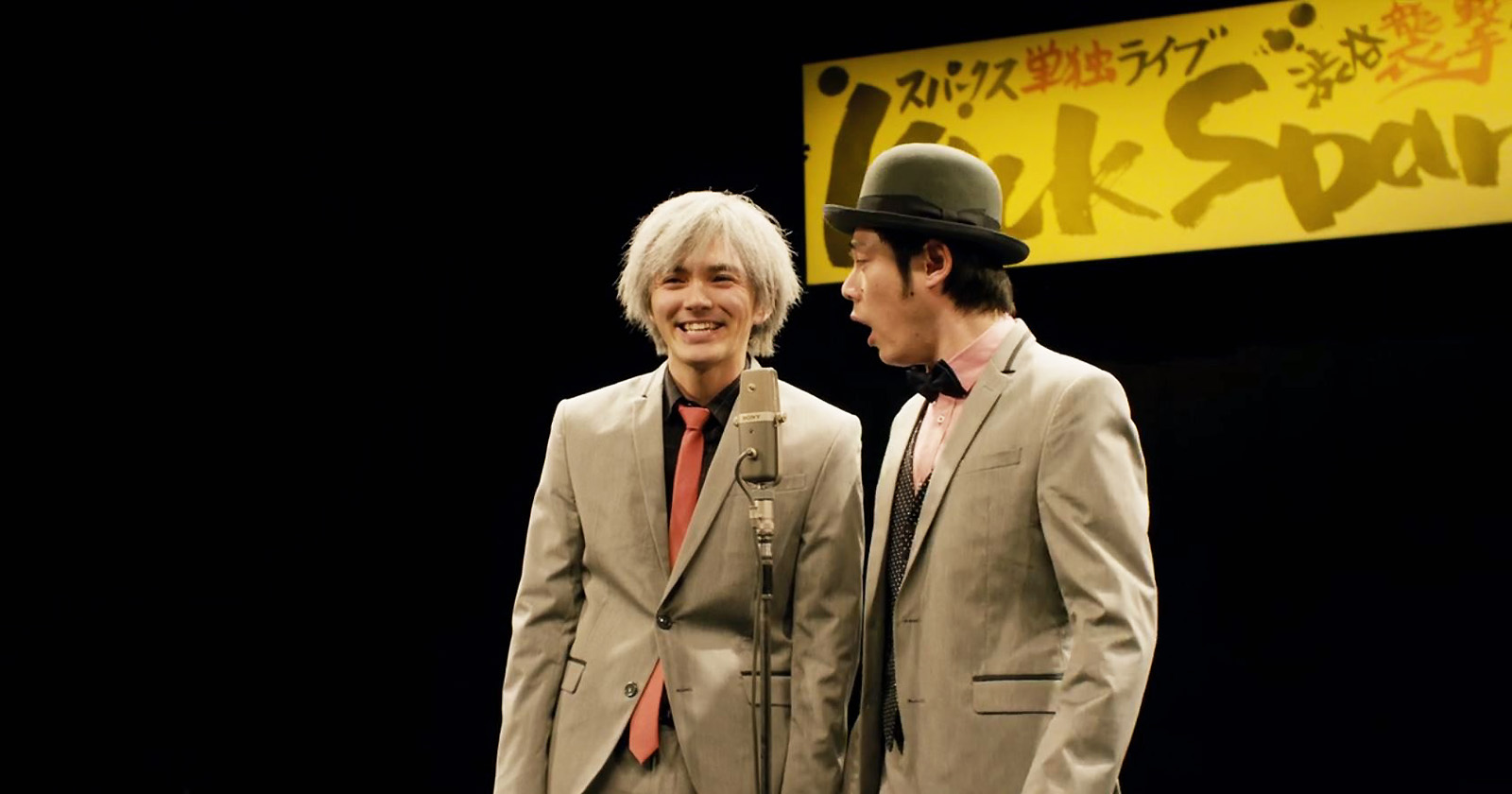
Kamiya uses people, and it seems that Tokunaga is the only one willing to stick with him. Kamiya has a “himo” (moocher) relationship with his smart and funny girlfriend Miki (Mugi Kadowaki), and the latches on to a simpler but honest runner-up when Miki inevitably cuts him loose. He uses his comedy partner for stability, but betrays him by building up such a hostile reputation that producers won’t hire them. Kamiya might even be using Tokunaga, too, but maybe that’s a secret Kamiya won’t even admit to himself, or maybe he’s just simply holding on to someone authentic who might be his intellectual and artistic equal.
The story moves slowly in the first half of the series, and I wonder if that’s due to the 10-episode Netflix structure. With just a little tightening, a little less indulgence in “on-the-street” reality shots, this could have been a dynamite 8 episodes (instead of 10), so it takes some real dedication to make it to the second half, where the conflicts really pay off. Kamiya is set up to represent something dangerous in episode 1 (Tokunaga remarks, “I had an uneasy feeling, but I had no idea why…”) but he doesn’t really challenge Tokunaga or threaten his goals. If anything, he’s an enabler, supporting Tokunaga’s off-center approach even when no one else will.

Hibana‘s true climax arrives in the early part of the final episode, where Sparks give a performance that finally succeeds in bringing something new to the manzai art form. Both hilarious and moving, it’s a moment neither member will ever forget. The denouement is dark, disturbing, and unresolved, and that’s what elevates the story past any modern convention. The fate of the comedy duo Sparks is sealed, but the story of Tokunaga and Kamiya seems ready to continue, and it’s anyone’s guess where it will go. There are some surprise revelations and a prosthetic that rivals Boogie Nights — it’s a bold ending that’s true to Tokunaga’s thoughtful, comedic spirit: it might not make you laugh, but it sticks with you.
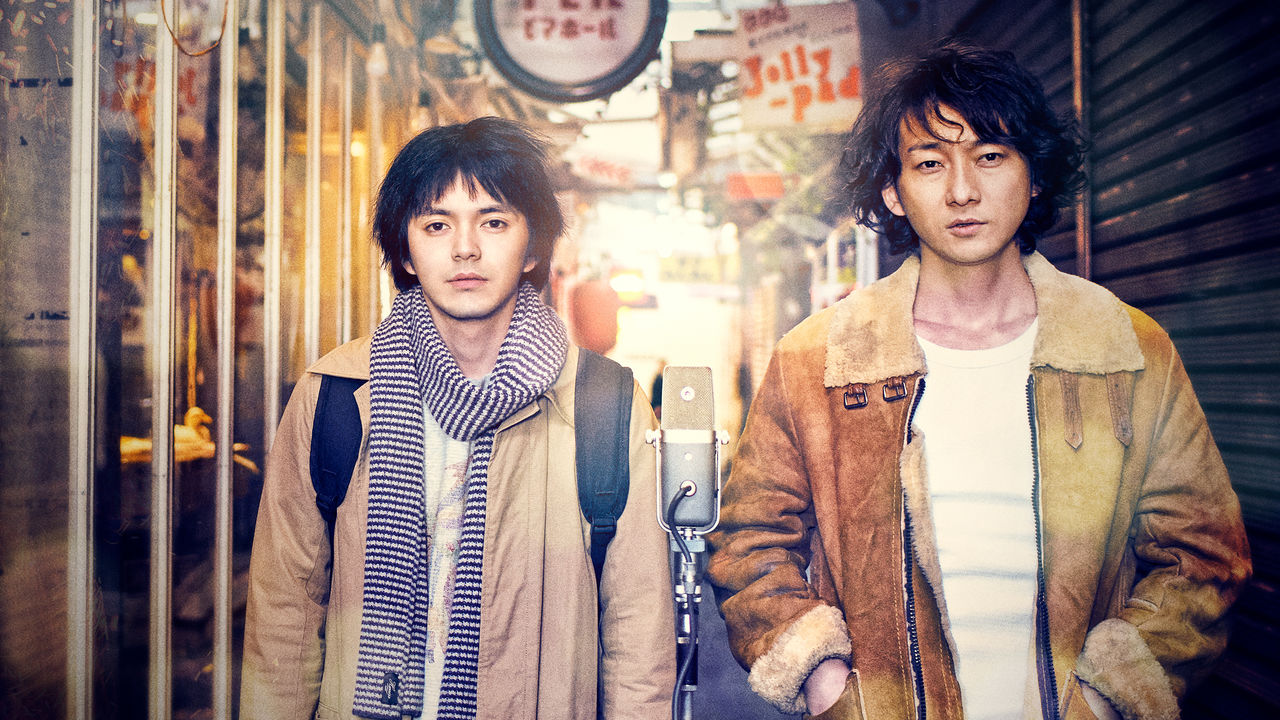
DYNAMIC DUO
Even with its rough edges, Hibana shines with the power of its two leads. Kento Hayashi (High & Low: The Movie, Arakawa Under The Bridge) is absolutely captivating as the angst-riiden but determined Tokunaga. When he’s not performing, he says little, but you can always see the wheels turning behind his eyes. Hayashi subtly plays double meanings in his lines, without telegraphing his intent or overplaying dramatic moments. His few unreserved outbursts are earned and truly effective.
Kazuki Namioka (Why Don’t You play in Hell?, 13 Assassins) is magnetic throughout. From his first moments on screen to the challenging final scene, his energy is inescapable, and he smartly know when to keep it below the surface. He forms Kamiya into a loveable puppy dog: once you adopt him, you’re going to love him no matter how many times he shits on the rug. There are countless opportunities in the story for a character like this to go over the top, but Namioka nails the bullseye on one tricky moment after another.
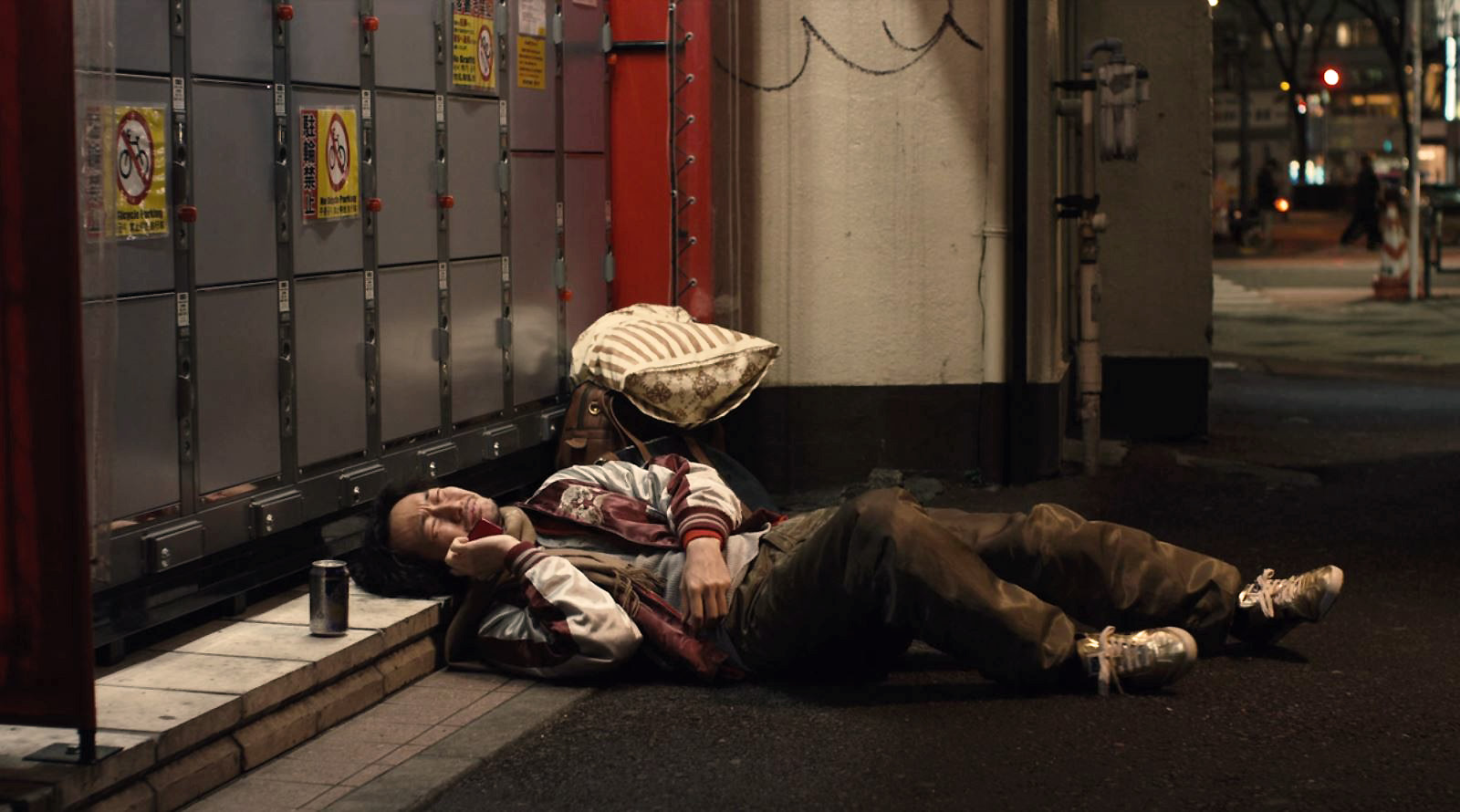
TOKYO STREET VIEW
The production’s on-the-street filming brings a great deal of authenticity, but it’s quite often distracting. Jumpy hand-held tracking shots and a lot of passerby gazes draw attention to themselves, but it’s a sacrifice in the name of immediacy and truth, which fits the story’s theme. There’s plenty of street-level reality on screen, izakayas full of smoke and beer, crowded alleys and run-down malls you don’t see in postcards. Hibana use of 5 different directors, supervised by Ryuichi Hiroki (Vibrator, Tokyo Trash Baby, Wolf Girl and Black Prince), makes look of the series stylish but inconsistent — occasional freeze frames and quick overlays of imaginary actions sometimes clue us in on Tokunaga’s feelings, but prolonged close-ups without voice-over are excruciatingly uncomfortable, at times when just a little hint of Tokunaga’s POV would have added some necessary balance to the story.
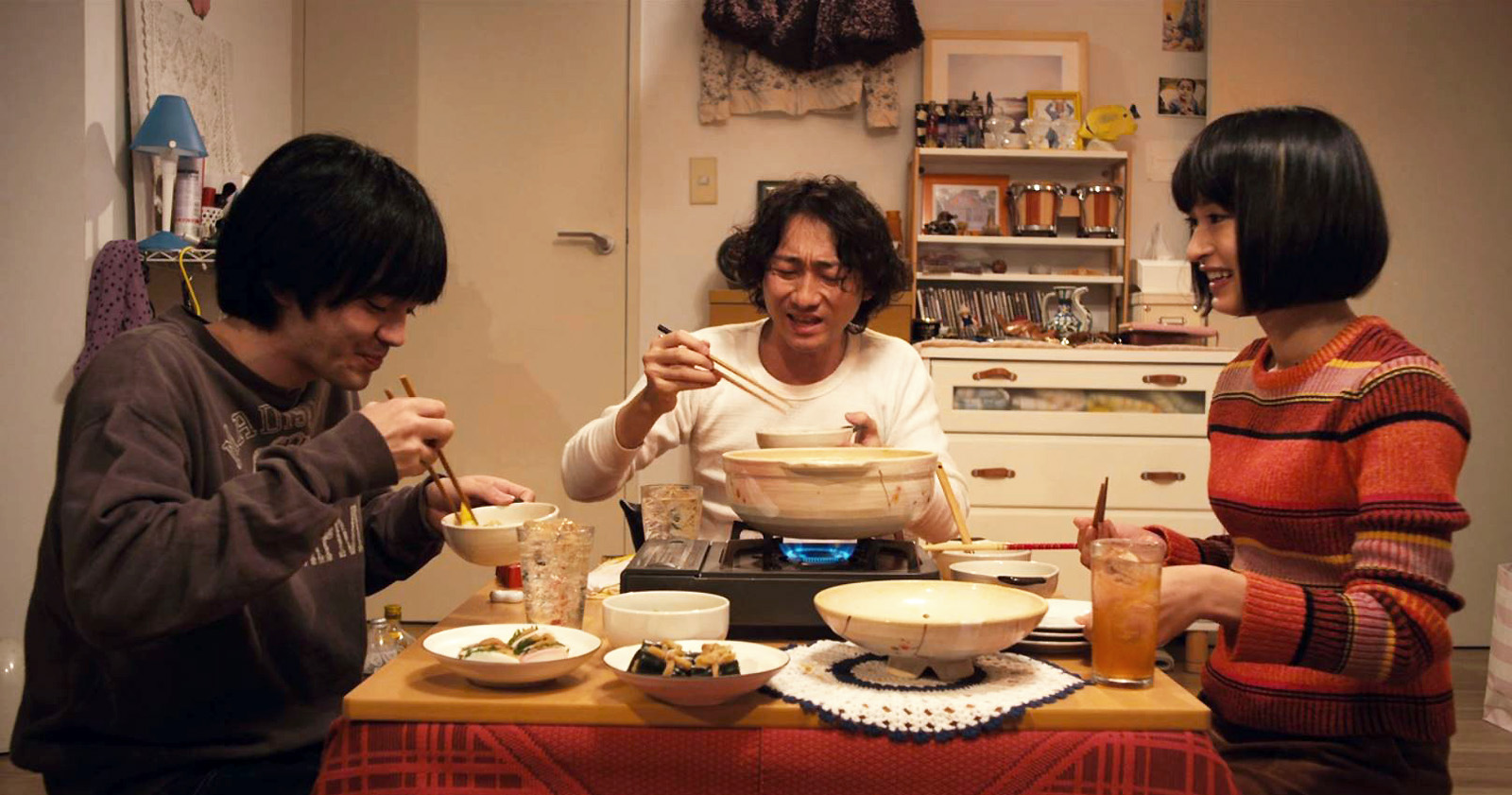
LAUGHTER & TEARS
To take the edge off the pathos, there’s plenty of humor on stage and off. Sparks and Ahondara sharpen their acts for some truly hilarious moments. Another great scene involves Tokunaga’s boner under protest as Kamiya moves out of Miki’s apartment. Tokunaga does his best to lighten the mood while Kamiya clutches his pillow like the man-child he is.
Hibana’s supporting cast is solid. Masao Yoshii is priceless as Yamashita, Sparks’ straight-man counterpart, and the pair have their comedy timing down pat. Yoshii is so sympathetic as the partner who wants success as bad as Tokunaga does, but doesn’t mind changing to please the masses. Mugi Kadowaki (Tantei no Tantei, Schoolgirl Complex) gives a sensible, smart presence to Miki. She knows what she’s getting from Kamiya, and she’s made the decision to hold on to it as long as it works. Tomorowo Taguchi (Monsterz, Gantz) lends some funny moments as Sparks’ earnest but eccentric manager.
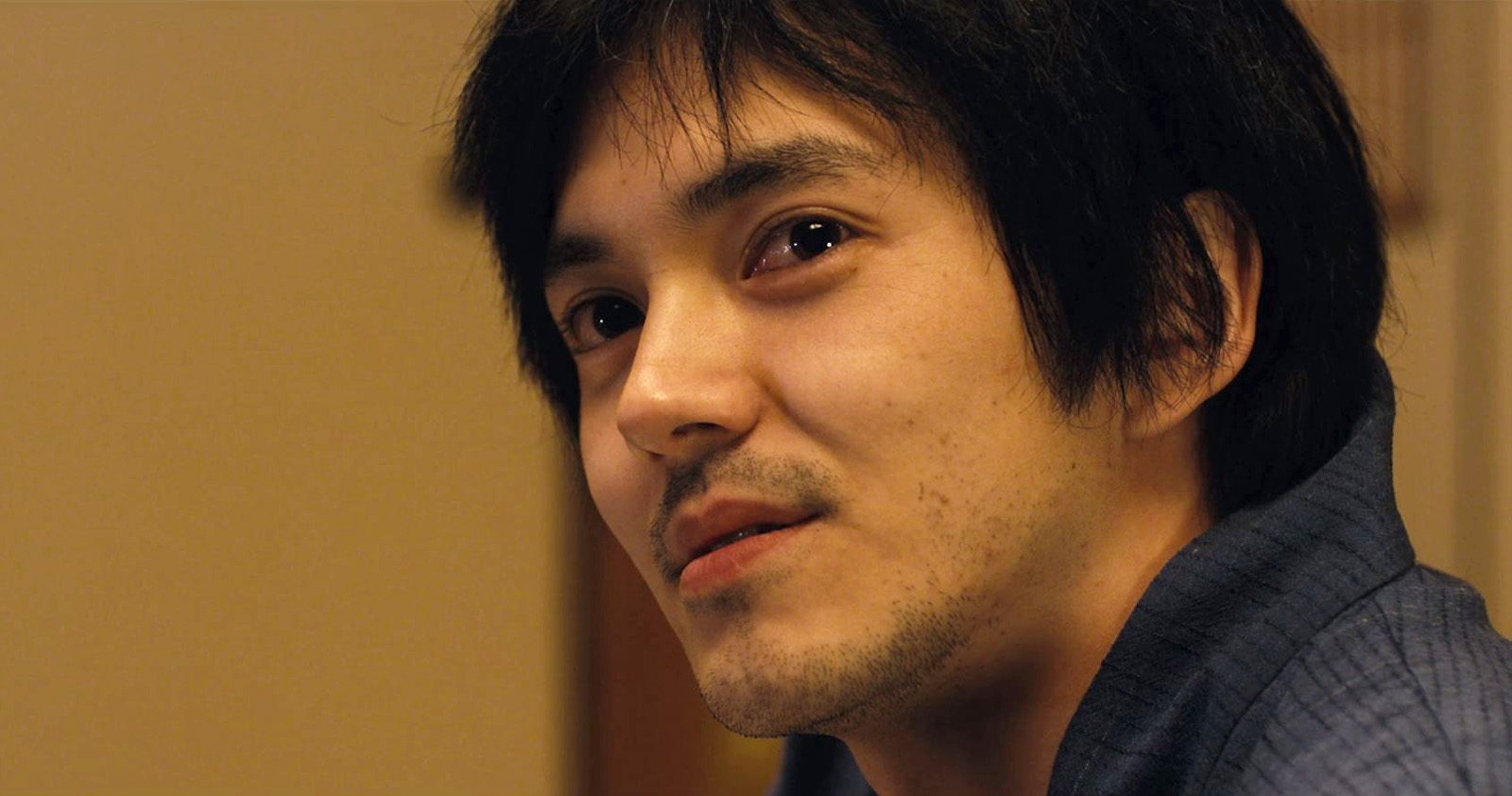
Produced by Yoshimoto Kogyo. A Netflix release.
Website:
(USA) https://www.netflix.com/title/80095626
(Japan) http://www.hibana-netflix.jp

